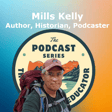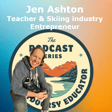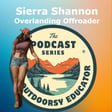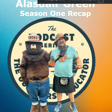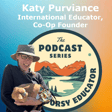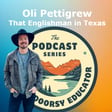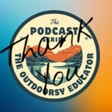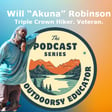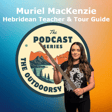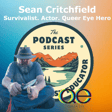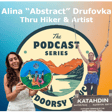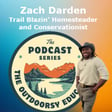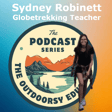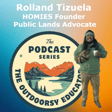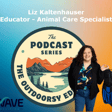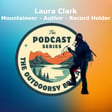Become a Creator today!Start creating today - Share your story with the world!
Start for free
00:00:00
00:00:01

Jeanette "JJ" Jolley
This weeks guest is Jeanette "JJ" Jolley, a woman who has worn many hats - Adventure travel producer, writer, hiker, corporate executive and many more! Join as as we discuss the importance of adventure and remembering your "why".
Recommended
Transcript
Introduction to the Outdoorsy Educator Podcast
00:00:00
Speaker
Hello and welcome to the Outdoorsy Educator podcast, the show where curiosity meets the open road. I'm your host Alistair and I invite you to join me as we explore the world through travel, nature, getting outside and the power of learning.
00:00:16
Speaker
Each episode we will dive into stories from inspiring educators, adventurers and global citizens who are reshaping what it means to learn Whether it's in a classroom, on a mountain trail, or even halfway across the world. From backpacking trips that change your perspective, to educational journeys that transform communities, we will cover it all. So pack your curiosity, lace up your boots, and let's discover how the world teaches us.
00:00:44
Speaker
One step, one story, one adventure at a time.
Introducing Jeanette JJ Jolly
00:00:52
Speaker
Jeanette JJ Jolly is a seasoned television producer, creative director, and outdoor adventure junkie who has filmed in over 80 countries, dodged downpours on glacier landings, and even funded a pig roast in a Belizean village, all in the name of chasing great stories.
00:01:09
Speaker
Her career took flight on the Paramount lot in the early 2000s, but her true calling came behind the camera, capturing raw, real and riveting moments in the wild.
00:01:20
Speaker
As a producer for ABC's Ocean Treks with Jeff Corwin, JJ helped bring wildlife conservation and culture to screens around the world, earning multiple Daytime Emmy nominations in the process.
00:01:34
Speaker
JJ, thank you so much for joining us today. Thank you for having me. I'm really excited and honored.
JJ's Family and Outdoor Upbringing
00:01:40
Speaker
Of course, I read through your bio online and we've of course chatted back and forth over the last week or two and I'm so excited to hear about you and hear about you as the real traveller, hear about where you came from, where you've been and all of these exciting stories. So why don't you start off by just telling us a little bit about where you're from, your childhood, growing up.
00:02:01
Speaker
that sort of thing. Well, i have a fun, crazy story. We don't need to get totally into this side, but I am adopted. and was adopted as a young baby. I was born in Santa Monica and adopted to a family in Southern California.
00:02:15
Speaker
And I scored the gold mine of what I say of families, because I came from a very large family that are all about the outdoors. that had a cabin outside Yosemite.
00:02:28
Speaker
And wow so summers were there and all other seasons we were at the beach, um, in Southern California. So I don't think I wore a pair of shoes till I was maybe 10 years old because I just ran barefoot everywhere from the mountains to the beach all the time.
00:02:43
Speaker
i love it. Yeah. Yeah. I've only been, i went to California for the first time in February. Um, we were in Los Angeles for a work thing and um Ended up driving down to meet a friend who lives in Riverside. Okay. And he's huge into camping.
00:03:02
Speaker
I mean, he's camping about three weekends a month, things like that.
California's Diverse Outdoor Beauty
00:03:07
Speaker
And it was just, I mean, just hearing his stories, it makes me want to go out there and really explore. He's up in Yosemite and things a lot.
00:03:15
Speaker
It's heavenly. Yeah. Yeah. And I knew it was there, but of course, starting just getting a glimpse of it, um, it it does truly whet the appetite for, all right, I need to get out to California more.
00:03:27
Speaker
You know, California, lot of people bash on it a little bit, you know, just I think of the reputation. but But where I grew up in Southern California, you had beach camping, then you had the bonfires that we did as as children. And then, you know, two hour drive, you're up at Big Bear, which is may another amazing outdoor place to go resource. It's starting to get a little overpopulated, but right.
00:03:51
Speaker
But then six hours you're up in Yosemite and then another six hours up the coastline, we were camping on the sand dunes. So literally it's, it's got so much outdoor ah resources to, to play with. I'm so glad
Leaving California for Nashville
00:04:05
Speaker
I grew up there. It was super fun.
00:04:06
Speaker
Yeah. Well, I had dinner with Roland and his wife when I was out there and something that they, it seemed to be bit of a trend was people were leaving California for, a cheaper place to live essentially.
00:04:19
Speaker
And then they wanted to come back, but had got themselves in a situation and an infrastructure and a mortgage and a this and a that, that but they really couldn't come back. And they wishes they wish that they could because it's the old thing, right? You don't know what you've got till it's gone.
00:04:33
Speaker
And yeah they didn't realize quite how much they would miss it. And perhaps their priorities had shifted too. um yeah So they they were saying that they've got no intention of leaving and um because they're well aware of how beautiful it is.
00:04:46
Speaker
It is. And the weather is fantastic. And I left in 2010 to move to Nashville, Tennessee. and Right. And I kind of, I don't ever say regrets. You know, it's just a different life lesson. but But I do regret it because cause the weather is so good. And then Once you leave, it's hard to come back because it is so much more expensive.
00:05:08
Speaker
But yeah, so I try and get back as much as i can to still see family that are there or take a trip you know to keep my
Family Traditions at Bass Lake
00:05:15
Speaker
that outdoor side. Because I mean, the pines and the sequoia smells are just unbelievable. Like that pine smell, I've never smelled anywhere, not even Washington or Oregon. It's a different kind of smell that reminds me of my childhood that you can't find anywhere else I had found in the United States.
00:05:32
Speaker
yeah Nowhere can replicate that. um Yeah, it's the same with me. I'm from Scotland and when I go back home, not so much pine trees and things, but yeah, there's smells. It's really the smell more than almost anything else.
00:05:44
Speaker
yeah um Yeah, you can't replicate those things. yeah um You can try as you might, but home will always be home. That is true. And there's something very, very special about that.
00:05:55
Speaker
um Yeah, so you grew up in California. You said you had a big family, is that correct? So I have a massively huge, awesome, big family. um And what is cool is my grandfather, who is pretty much a Los Angeles native, bought some land at a lake called Bass Lake, California, which is about an hour outside of Yosemite.
00:06:16
Speaker
um and he built a cabin in the 70s with the intention of knowing he wanted all his grandchildren to be here and have a summer place to have. So him and my uncles and friends, like, hand-built this gorgeous cabin on Bass Lake, California, and it had its own private beach with a dock. So when I say I was adopted to the best family ever, I really can't, like, ever complain because, I mean, it was just the best ultimate summers. And Growing up, they had some requirements.
00:06:49
Speaker
No television. Obviously, there were no cell phones back in the 70s, 80s.
00:06:56
Speaker
um And we really didn't even have a radio. like I would bring my little Fisher Price like player and a couple of my little boom boxes when I was got older. But grandma and grandpa did not want us.
00:07:07
Speaker
having like outside noise, not for a bad reason or rules. They really wanted all of us kids just to be active and outdoors and engage with each other. And so our aunts and uncles, we all grew up pretty close. So either our pretty parents would come up and drop us off and then they would all go home and grandma and grandpa would watch us or they would like, we'd all car pull up. Like one aunt or uncle would like load us up as many that wanted to go for a few weeks up at the cabin. And I mean, we were laid out between bedrooms and sleeping on the floor, um and it didn't matter. It was the best like summers of my lifetime because you'd wake up at the sunrise, you'd hear the boats out on the lake, and it's either you'd get up early enough to catch Grandpa on the first boat run to go skiing on the glass, or you'd have to wait till lunchtime to get round two with him.
00:07:57
Speaker
But I mean, he, grandpa taught us how to fish. He built us this massive swing rope swing over the water. And then also over like outside the cabin land.
00:08:09
Speaker
And that was my summers was barefoot in the woods, hiking down to the the beach and either fishing or, you know, learning, being with grandma and learning how to cook and write for the fires for everybody. And it was, it was literally, I can't even tell you like,
00:08:27
Speaker
how special it was to have that in our family and have that relationship. And I think because of it, my cousins and I, um, we're all extra close, um, to this day in our adult life because of it. And times have changed. So we try and implement things. I don't have children, but they all do.
00:08:44
Speaker
But they've implemented the outdoors a little bit, but not quite as rough as we used to have it. But I'm so glad. And I'm glad I never really watched television growing up. um Right.
00:08:56
Speaker
Just immerse myself in nature and stuff. Yeah, I was going to ask you how these these wonderful experiences have passed themselves on generationally. And I suppose, as you said, that if your cousins have had children, that they're sort trying to don't replicate is the right one, but certainly honor the way that your grandpa had raised you guys.
00:09:17
Speaker
Um, and perhaps in your career, you're doing a little bit of that too.
JJ's Journey into TV Production
00:09:21
Speaker
Um, I did. And so it's fun. As I say, I didn't watch television growing up, right but I always had a fascination with the arts and being from Los Angeles, you know, I was ah around it a lot and immersed around it and stuff.
00:09:35
Speaker
Um, It's interesting I ended up going into that career because it wasn't kind of my path. But when I did and I started in television, I was working um on various um TV lots and award shows.
00:09:50
Speaker
I knew early on I wanted to be a TV producer. And then when I got the travel bug, even more so, um I was like, how how do I merge these two? How do I get to see more of the world and still make television?
00:10:04
Speaker
And it took me a while and I can, I'll get to it, but it, it was so fun just trying to figure out those things. And then it was like, how do I get to nature stuff? How do I get to speak other languages?
00:10:16
Speaker
Um, it wasn't easy. It was a lot of work to get there. horse So I don't want people to think that, Oh, it just I got this job and I started traveling the world. No, it took many years, a lot of hard work to learn how to be a travel producer.
00:10:29
Speaker
But it was it was the best thing. And i think it I think having an outdoor background and roughing it a lot as a kid, um you know learning how to go to the bathroom in the woods around a bunch of boys. and Right, right, right.
00:10:46
Speaker
It helped toughen me up for what road life is like doing adventure travel outdoor shows. um Because it's fun and it's glamorous and you get to see so many things. But it is no sleep.
00:10:59
Speaker
you're up before the sunrise to be ready for that sunrise shot. And then you got to stay till the sun sets, which means very long days, 18, 20 hour days to do a film shoot.
00:11:10
Speaker
And, and that helped prepare me for what would end up being my career out in the outdoors. I find that so interesting because I imagine most people who want to get into travel television want to be the person in front of the camera. They want to be the host.
00:11:26
Speaker
They want to be the one doing the interviews, but you opted to be more behind the scenes. um What do you think that motivation was to to be a producer rather than what I feel most people who want to be in that industry want to do?
00:11:41
Speaker
I have never had a desire to be in front of the camera. um I have so much respect for everybody that does because it is a lot of work um to be on. And then when you're a hosting, you know, if as much as a producer can prep and prepare, sometimes the interview doesn't go as as engaging. And so it's a lot of responsibility on the host to keep it going and keep the segments going um as much as they can.
00:12:08
Speaker
i just never had a desire for that. um i I love the complexity of putting that puzzle together and all the pieces as much as you can and preparing it.
00:12:24
Speaker
um And I like the advanced work it takes to do that. Right. And then you prep your host, you know, you give them your notes. So they're ready and educated um as best as they can to do the segment.
00:12:38
Speaker
And then You cross your fingers that it all works. Fix it in post. Fix it in editing. Right. Fix it afterwards. But I, when I got into my career, and I honestly was about a year or two in, and I was watching different producers and how they do it from scripted to live shows to, I was working for some HGTV shows to, of all the shows that I had done on this glamorous job and working with big celebrities, I loved the HGTV stuff. I loved the being outdoors. I loved the building of things and how like, if it doesn't go right, how do you figure out your backup plan and be ready for a at plan A, B, and C. And I've still been that way in my like professional life and personal life. Always have three plans ready to go.
00:13:26
Speaker
And that I
Behind-the-Scenes of Adventure Travel Shows
00:13:28
Speaker
loved. And so from there, when I started doing HGTV shows, then I started doing some reality shows. And then from there, it led to some bigger home makeover shows that did very well. And then when that happened, that catapulted my career and I started traveling 300 days a year and I got the bug and that was like at 24, 25. And I've never looked back since because I love, one thing I love about being producer is you get to go in early.
00:13:58
Speaker
So sometimes if on a good show, if there's enough time, you get ah to go in early, like a month early, but average is about one to two weeks. And, And so you get to really meet the town and the culture of the town, whether anywhere in the United States to anywhere in the world.
00:14:14
Speaker
And you, you're not rushed when the film crew comes in. I see. Right. yeah Once the film crew comes in, that's when the clock starts of, of money more so. And so you want as a producer, make sure you've prepped and got everything ready because time is money and you've got to like have all your ducks in row. So when you're preparing and I'm out in a country,
00:14:36
Speaker
I can have a lunch or a coffee with whoever the subject is that the host is gonna interview and take my time and really build trust in a relationship.
00:14:47
Speaker
So when the film crew comes in, they already like know they're gonna be taken care of and it's not gonna be exploited for television. Does that make sense?
00:14:57
Speaker
That makes perfect sense. I find that really, really interesting. All these things that we don't see, all the prep work, all the behind the scenes. While you were talking, it reminded me of, I don't know if you've ever seen a lot of the BBC wildlife documentaries. with the David Attenborough famously does a lot of the narration.
00:15:15
Speaker
And I find those shows fascinating, but equally as interesting to me is often at the end of a series, say, The Life of Plants. They'll show you how it was made. And these guys who were up in a tree in a hammock for three weeks just trying to get that shot,
00:15:30
Speaker
And there is part of me that finds that just absolutely fascinating. um All the work you don't see for seven seconds or trying to catch something that people know exists but haven't seen.
00:15:43
Speaker
um so the true unsung heroes, I feel almost of this of this industry. I find it so and ah really, really fascinating to me. um They really are. And you know what I love that of all the crews I've met around the world and those that I still haven't met that I have so much respect for is it's not just getting up the tree, but a lot of times we have to take 200 pounds of gear on our back up many, many miles of where like a lot of times we work with research scientists that know where these locations are.
00:16:15
Speaker
And so they'll guide us up there. We're hiking it up. but Sometimes you can get mules and, and um you know, Sherpas to help you. But a lot of times we're all taking all of the gear and hiking it up miles and miles. Then we got to rope it up the tree, you know. So it takes a lot of physical, mental strength and patience to just even get ready for the shot.
00:16:38
Speaker
that I've had to learn over the years. um Nothing's instant. um Drones were one of the greatest things ever because that helped ah cut some of the work we have do. can imagine, yeah.
00:16:48
Speaker
But a lot of places in the world sometimes don't let you fly the drones. And so you still have to find different ways and creative ways you're going to get that shot. Well, you kind of touched on this and I find it interesting when all this behind the scenes work physical and mental.
Maintaining Health in Challenging Environments
00:17:03
Speaker
Like, how do you keep yourself going? Like, I know you're quite an advocate for sort clean living and deep health. um how How do you keep yourself, you know, physically and mentally where you need to be? Because I assume you have to be sharp and on for very long periods of the day, um every day that you're out there working.
00:17:21
Speaker
you're You're sweet. Thank you. um You know, i have not always been the healthiest, but I've had to navigate it through life I used to be when early in my career, I would be drinking 12 Diet Cokes a day, which is probably the worst thing for you right out there and energy drinks. And sometimes you need that every now and then a pickup.
00:17:43
Speaker
But being an outdoor adventure producer, um both men and women, um really clean eating and and electrolytes and healthy electrolytes are so essential because you are out there for long hours. Like I said, you're up.
00:18:00
Speaker
at dark before the sun rises to get that shot for the sun sunrise. And you're staying out there for 18 hours until the sun sets. um Overtime, so to say, is not a thing. You just do it.
00:18:13
Speaker
um So you have to stay physically fit um when you're out there on the road training and at the gym, even if it's little things. But when I'm not on the road, I am training six days a week in the gym.
00:18:25
Speaker
and very clean eating because if you're not sharp here um and you know no brain fog, you can't, then sometimes you miss the animal. You've got to be aware and all your senses have to be on when you're out there in the wild. And if you're tired, fatigued,
00:18:43
Speaker
um you know not feeling good, because sometimes you're not eating the best stuff, your body's got to be ready to handle what ever country you're in. And that's important.
00:18:53
Speaker
That's important. And that's one thing that I really push and stress for people who want to get into the travel adventure space, whether it's like working on Amazing Race or Survivor or or doing a travel show like I do with like, let's say Planet Earth or um a BBC show, other BBC shows.
00:19:12
Speaker
you've got to be physically ready because usually you only get a week notice of the call of where you're going to go in the world. And if you're not physically and mentally ready, then you're not going to be the best out there. And there have been times i have been out there where I was not both physically and emotionally ready. And, and it, I feel like I didn't give my best work, you know, while you're out there, cause you're thinking about home stress or,
00:19:38
Speaker
I need to go to a doctor or this or. And so now now I travel with a whole suitcase of my own um vitamins and essentials and all the food that the country will let me bring in and protein bars and stuff, certain type of protein bars, because I don't want to take a risk out on the road of not being my mentally best and physically best that I can be.
00:20:04
Speaker
Right, that's it's so interesting. I'm sure it's taken you probably years of trying different things and packing this and packing that and and and figuring out what works for you when you're on the road.
00:20:15
Speaker
yeah Yeah, there's a running joke in my family that I take the whole kitchen, including the kitchen sink when I travel. right lin I have the the blender balls. I have 20 million packs of proteins and stuff that my family laughs that that suitcase is heavier than my own clothes because I just bring so much out on the road.
00:20:35
Speaker
But it works, right? You're doing what works for you. It works. 26 years later, I'm still here. So it works. love that. Well, I mean, yeah it seems that you've traveled to what over 80 countries.
00:20:48
Speaker
What one was the most difficult to get the things that you'd want to bring with you into? Where did you run into the biggest problems?
Travel Challenges with Customs in Australia
00:20:55
Speaker
You're going to laugh. So when I travel, I always try and look up what the requirements are, make sure we're not bringing anything in we're not supposed to. A lot of times, seeds, you're not allowed to bring seeds into a country. So you want to make sure that's not hiding anywhere in your, in your bags that you forgot about or something like that.
00:21:10
Speaker
I was thinking about this this morning when I was trying to think of stories with you and we were traveling to Australia. this was, um, um when I was working with Jeff Corwin. And so Jeff Corwin, amazing, amazing, talented host.
00:21:24
Speaker
um And there's certain things he likes on the road from America. And so we have a whole, again, whole entire suitcase that weighs about 100 pounds of all of his snacks. And that was my job to travel with the snacks to get it in early before he got there.
00:21:40
Speaker
And we get to Australia and it's nothing, you know, but his nuts and I forgot again, seeds and beef jerky. Like we're talking like almost a thousand dollars worth of beef jerky I had in this bag that the crew in him love to eat.
00:21:55
Speaker
And I get stopped at customs and it wasn't even just a stop. It was, we're going back and we're interviewing you. Are you selling this? What are your intentions? um And also all of this is not allowed in the country.
00:22:08
Speaker
And I'm thinking to myself, I'm going to lose my job. If I don't have the snacks for the crew and Jeff, like what am I going to do? How am I going talk my way out of this? I'm trying to convince them. I'm like, it's for for a film crew and we're not here selling it. you know I'm trying every stop I can. Right, of course. because this gets through And if my memory serves me right, they would not let us bring in our seeds or beef jerky. They confiscated it and I was just besides myself.
00:22:34
Speaker
I thought, oh my heavens, I can't believe I made this mistake. I didn't think that beef jerky would be a thing that I couldn't bring into the country. The the sea, like nuts and seeds. I was like, oh yeah, that kind of makes sense.
00:22:45
Speaker
I just, should have put two and two together but but they confiscated like thousands of dollars of food from us right thankfully they i assume let you go but luckily i got out and they let me go and but i was really surprised because i'm like well it's a pretty much it's a very modern country like they should have let us in it's not like we were in the remote woods of africa or something like that but But they're just trying to protect their country and do what's right. It's not the first time I've heard that about Australia. And I think being an island nation, it's just different is because they can control what comes in and out easier, I suppose, than say the United States where it's land border, or seaboard, all of that stuff.
00:23:28
Speaker
Yeah. um yeah as its You can keep things out that you want to keep out in an easier way, I suppose. when there's not a big land border with a country that allows whatever it might be.
00:23:40
Speaker
Yeah, yeah, that's true. yeah I just remember being so afraid I was either gonna get this massive fine and have to call my boss or i was going to lose my job because now the crew and the host don't have what they need, that their favorites.
00:23:52
Speaker
ah But it all worked out. It all worked out. We found some substitutes. Yeah. but I'd love to hear about that transition from shows like Extreme Home Makeover that you produced to the travel adventure space with people like Jeff Corwin, who's a well-known travel host um here in the States.
00:24:09
Speaker
How did that transition happen? And was it everything you hoped it would be?
Transition to Working with Jeff Corwin
00:24:15
Speaker
Thank you for asking that because I just got chills thinking about my time with Jeff Corwin because it was some of the best years of my life that I learned so much.
00:24:26
Speaker
When I was on Extreme Home Makeover, that's when I really got the travel bug because in the time that I was at on Extreme Home Makeover, I think I worked in like 30 states at that time. um and so that...
00:24:39
Speaker
preparation of going into a city and how to pull permits and work with your local police and um where you can drone, can't drone, um just in the United States, have really helped me think globally and how I could take this. And so from my experience of working on Extreme Home Makeover, I started doing a lot of hotel commercials.
00:25:00
Speaker
So I was down in Mexico doing some Marriott commercials, Hilton commercials. I was up in Canada, um also doing some you know i think it was Hilton at the time, commercials. So that's where I really got my feet wet of preparing internationally and how to work internationally.
00:25:18
Speaker
And there's some things when you work internationally, depending on the country, of how much local crew you have to hire and then bringing in your United States crew. but And so and then that's also where you learn how to um pull a carne and which is all your gear list.
00:25:34
Speaker
So you can't go into a country without submitting this massive form to our U.S. government that then prepares it for the foreign government to make sure you're not going to bring in all this expensive equipment and sell it.
00:25:46
Speaker
So what you bring in, you're going to bring out. Again, things that we just don't know about when we're sitting on the couch watching a TV show. This is fascinating. Months and months of planning it goes into before you can go into a country.
00:25:59
Speaker
Again, so you're not going to illegally sell anything. um you can't just come in as a United States country film crew and just go film. and Legally, you're not supposed to do that. It happens, but legally, you're not supposed to. You're supposed to work with a local and the money, it's the money exchanges and stuff that has to happen in that regard. And so that's where you work with a local producer, which in the film business, we call a fixer.
00:26:27
Speaker
Your fixers are your best friends as a venture producer. Not only do they know that country really, really well and their resources and stuff, but navigating all of the permits. And it's actually, I find harder to film in foreign countries and more permits required than in the United States.
00:26:45
Speaker
So you really have to work with that person to make sure you have everything legally ready and legally prepared and insurance. Say you crash your drone in Santorini and,
00:26:55
Speaker
start this massive fire there, you have to have a certain type of insurance that that local producer also helps navigate you through. so so the days of like filming with your phone, easy peasy, but when you, what you watch on Netflix and now right there is a massive legal paperwork process. We as producers have to follow in order for that to be on television screen.
00:27:21
Speaker
um And it's that was one thing that I was never prepared for as a producer that I wish I had learned earlier on. But the amount of paperwork and permits I do and plan for a before a film shoot actually happens is pretty massive to make sure we're not kicked out of a place, you know, then you know, or start a fire and the drone crashes. Like we want to make sure all our ducks are in row.
00:27:48
Speaker
And it's always when you've, you've gone and done everything, you never usually have a problem, but let's say you kind of forgot something or we decided to go off rogue a little bit and go somewhere else. um And you're like, okay, do I call the film permit office? Let them know. Do I not? Do we do, should we do this? You know, and usually I i do call them to make sure we're, we're a-okay and maybe don't need to pull permit.
00:28:07
Speaker
But sometimes when you don't, the next thing you know, you're stopped by the cops and this i knew I should have pulled that permit. Right, did you just wish you had done it. And suppose the permitting must look so different. Extreme Home Makeover, sort of i assume that all of that was filmed in the United States.
00:28:26
Speaker
That must seem so simple. I'm trying to think somewhere Jeff Corbyn went, and of course it's escaped off the top of my head, but let's say going to Australia to go to the Great Barrier Reef, something like that.
00:28:37
Speaker
the um It must be many times the paperwork and the headache and the hassle transitioning over to the adventure travel world as a producer. You kind use the word headache or hassle. Is it a hassle? Kind of, but it's our job.
00:28:53
Speaker
I suppose, yes. And they these countries do it um for a really good reason. They want to make sure environmentally we're not going to damage anything that's out there as a film crew.
00:29:05
Speaker
that we're not gonna be touching certain things we shouldn't be touching, that's gonna mess up this ecosystem, that um they've that country has worked so hard to protect. So a lot of places we go um in film, like with Jeff, we have to have a scientist, a research scientist with us that's part of that ecosystem of wherever we're at or guide to one, either be on camera if it works out, if not, then just there to help us and make sure we're in the right places that we should be.
00:29:34
Speaker
um So I wouldn't use the word hassle or headache. I would say more so I respect it.
Environmental Regulations in Filming
00:29:40
Speaker
Does it make my job a little bit more difficult? Yeah. But I respect what they bring to the table because I don't, we don't want to go in as a film crew, especially with Jeff. I mean, Jeff is so,
00:29:51
Speaker
environmentally con conscientious that I want to make sure and the team wants to make sure we're doing everything proper and respectful in that country um because not only are we representing that country but also we're working together and representing what Jeff's knowledge and degree is in and making sure he's set up for success.
00:30:14
Speaker
Yeah, you're absolutely right. I mean, it's yeah, mind shift. Change. is It's ah thinking about camping and hiking, you know, just leave no trace. You could view that as a bit a hassle, but of course, honestly, we're just preserving the land, taking care of the land for the land's sake and for the next generation.
00:30:30
Speaker
Now, so of course, you're absolutely right. I'm sure there's some frustrations, but bigger picture, this is very, very important that we're doing that and preserving wherever it is you may go in the world.
00:30:41
Speaker
Yeah. So you can inspire people by making the shows, and make sure it's it's ready for them when they come to visit by having taken care of it ethically. ah No, so i really appreciate that explanation. You're exactly right.
00:30:53
Speaker
yeah um And how, so you've you've alluded to the fact that Jeff Jeff was a pretty awesome guy. yeah What was he like behind the scenes? What is he like you know behind the scenes,
Positive Experiences with Jeff Corwin
00:31:02
Speaker
off the camera? Was he as wonderful as he appears to be when we see him on our television sets?
00:31:07
Speaker
Oh my gosh. I had the best years with Jeff and the crew. and Jeff is, again, one of the most knowledgeable people I've ever worked with in my career, especially in conservation. And so when we would prepare for segments,
00:31:20
Speaker
um and discuss different ideas between him and our co-executive producer who's been with him for many, many years. um it We would just laugh. Oh my gosh, he's so much fun.
00:31:33
Speaker
Big practical joker. So you got to be watching yourself. And i think when I first started with him, I never alluded, I did not like snakes because I heard he'll play a joke on you, maybe put a snake in your hotel room.
00:31:47
Speaker
or you know have a snake somewhere hiding at the gear. So for the first while, I avoided snake stories. i Again, I will go swim with sharks, tarantulas, jump a cliff, no problem.
00:32:00
Speaker
But you put me around a snake and I will lose my mind. I don't like it. And Jeff, being, you know, biologists, you know, loves snakes and that loves to do snake stories.
00:32:12
Speaker
So the first season I worked with them, I got lucky. I avoided snake stories and they would ask me, oh, well in that country or is is there this or that? And that these kinds of, I was like, nope, no snakes, no snakes. No, no, we don't want to do snake story. I'm like, this other story is so much more fun and exciting.
00:32:27
Speaker
And then it was my second season with them. I think my first snake story, think was in Dominica. We were doing some boa constrictor stories they they wanted to do over there, working with some different scientists.
00:32:42
Speaker
It was the hardest day of my life. Oh my goodness. And at that point, he knew i did not like snakes. Luckily, this is where he he's such a good soul. He never played a practical joke me. Good for him.
00:32:53
Speaker
Excellent. But my friend, oh man, when we had to do that snake story and that, I mean, it was so big of a snake and And I just was like, how far of a distance can I keep while filming and doing my job and not be around it?
00:33:08
Speaker
um And he was a good soul about it. But Jeff is so much fun. he has been, i think, to almost every country in the world and filmed in every country in the world. I mean, he's been on TV for so many years.
00:33:19
Speaker
And so he knows so much about every ecosystem around the world. And just, again, I just soaked it up with him, um you know, and when segments didn't go as planned, you know, just a good soul of being able to work together on our feet to pivot.
00:33:38
Speaker
Um, and that does happen out there with weather, but I think I've laughed more and his, uh, learn more about food and my food palette grew with him because he has such a cultural palette. And so,
00:33:53
Speaker
trying new things and experiencing new foods around the world as we went to these different countries was a blast to share that with him. Yeah, he always strikes me as one of these people, a bit in a similar vein to, say, Samantha Brown, the late, great Steve Irwin, even the late Anthony Bourdain, people who would be doing this stuff even if the cameras weren't there.
00:34:15
Speaker
you know And you can kind of feel it. You can feel that energy and that passion that he's not making a TV show for television's sake. It's to... get the you know communicate the passion and the importance of what he's talking about.
00:34:29
Speaker
And television is just the medium by which he's doing it. He's always struck me somebody who's not looking to be a star.
00:34:38
Speaker
You 100% nailed it. Jeff Corwin is who you see on TV, is who you see at home and who you see in the office. um And the authenticity of him,
00:34:50
Speaker
just is unbelievable. And what I admire even after all these years is he still is working um to help the next generations and teach the next generations.
00:35:02
Speaker
um Our show at the time was on ABC Saturday mornings and his new show now, which I'm not a part of um because I've gone on to do some different things, but is on CBS Saturday mornings.
00:35:14
Speaker
So I love that he's still out there. the same human that he was when he first started and helping educate and teach this next generation that's coming up about conservation and animals.
00:35:26
Speaker
Yeah, I love it. I'm actually interviewing somebody tomorrow who has been inspired by him and does marine conservation. So it's, I just love that he probably, of course, has no idea how many lives he has touched.
00:35:38
Speaker
um um Just, yeah, his reach will know no bounds. So it's such a wonderful thing. Yeah. I'm very, very honored to have spent the years I did with him and and the crew. And a lot of the crew are still with him today.
00:35:52
Speaker
um His executive producer that has been with him, oh, Sarah is amazing for, I don't know how many years at this point, at least 10 or more years. um She's still with him to producing TV. And I just think that is one of the most admirable things. And that says a lot about who Jeff is, that his team has stayed with him for all these years. I had some personal things kind of change in my life, which is why I didn't stay on the show. But But I would love to go back in a heartbeat. That would be fun.
00:36:19
Speaker
I love that. Yeah, it speaks volumes about who he is as a person. um So I'm very thankful for you that you had that experience with him. But then you transitioned away from from TV and producing um and became the creative creative director of
From TV to Creative Director for an Outdoor Brand
00:36:34
Speaker
an outdoor brand. I'd love for you to tell us a little bit about that transition and what that meant for you.
00:36:40
Speaker
Well, when I got the call to to jump on and go the corporate route, it was a lot of consideration for me, for me to go corporate. I've been freelance but adventure producer now at that point for about 20 plus years. And so...
00:36:57
Speaker
There's a freedom you like when you're an outdoor producer that you don't, I don't know about you, but sometimes you don't like authority or having to be a nine to five in an office. And so right I like being able to wear my North face every day to work.
00:37:12
Speaker
So I thought, Oh man, do I, do I really want to do this? Does this make sense? Um, but how, I'll never say never had it been a different brand that might've been not in the the vein. I don't know if I would have chosen it.
00:37:25
Speaker
Um, but because it was an outdoor brand and I lived the lifestyle, I camp, it wasn't like I turned 18 and I stopped camping. I, to this day do van life and I'm camping every summer day that I can up until it's snowing.
00:37:40
Speaker
So it seemed like it was a fit. And, uh, I didn't have to be in the corporate office very often, so that worked out very well for me. Good. um And so I said, you know what? the I was honored they asked me to do it.
00:37:55
Speaker
And I said, you know, if there's any other person that could do it and know this lifestyle and work to – at the end of the day, help sell this lifestyle to other people so they will want to be part of it.
00:38:09
Speaker
ah Let me take on the challenge. Let me do it. Let me do it. love that. Great. So I did. I walked away from from TV and everybody thought I was crazy. I have had at this point you know multiple awards in television and they said, what are you thinking? like You're kind of at the peak of your career. like Are you sure this is what you wanted to do?
00:38:30
Speaker
And that goes back so when you're an adventure producer, you love a good challenge. So we don't like any day ever the same. And so I said, let's do it. Let's do it.
00:38:41
Speaker
I said, this sounds like ah every day will be a little different and let's give it a try. And I'm so glad I did it. It was probably one of the hardest jobs I've ever done compared to anything in Hollywood.
00:38:53
Speaker
Um, not only because you're learning all of the corporate side of marketing and running a very large outdoor brand, but at the other side of it too, we had RVs we were dealing with and getting supplies. And when you go do these commercial shoots and video shoots, sometimes you want the most picturesque location is not the easiest to get an RV and models and talent and then extra ah RVs for the talent. Cause there's no cabins.
00:39:23
Speaker
So they're comfortable to do these shoots. um So it challenged me in other creative ways of of wanting to portray. And that was my end goal was I want the audience. I want the buyers to feel the passion that I have for the outdoors and inspire them to get outside more. It's not just buying a product.
00:39:44
Speaker
I want them to love this lifestyle as much as I do. I want to make sure I am like whether we're you know in a small RV to you know some 40-footer RVs that I am showing them everything I love about this and just want to live outside every day like I do.
00:40:05
Speaker
So it was a big thing to me that I'm not just a corporate stuffy person trying to sell an outdoor clothing or outdoor lifestyle. No, I live this lifestyle. I live my life down, come live it with me.
00:40:17
Speaker
And so it was two year contract I did that was just immensely so much fun. um Every two weeks we were shooting a new commercial somewhere in the in the United States, but it was the hardest job I ever did. I was happy.
00:40:35
Speaker
That's wonderful. Now how do you think you changed as a person from when you went into this two year contract to when you came out?
Corporate Experience and Brand Marketing
00:40:42
Speaker
What was the biggest change you felt?
00:40:46
Speaker
For me, um I learned through that job and working in the outdoor lifestyle. um There's the corporate side, which is not as as exciting.
00:40:58
Speaker
But when you're in the outdoor brand world, or if you want to be I don't like to use the word influencer, but I want to say just educator on social media.
00:41:09
Speaker
right The back end of marketing and how to speak to your audience, I was so grateful that I learned that I didn't know before. And I walked away with, I felt like the best master's program in brand marketing that anybody could have ever asked for, ah which is great.
00:41:28
Speaker
The other side I learned is because social media and websites need to change so fast, so often, there is hundreds, thousands of hours of content you need to get for a brand that is constantly evolving, constantly changing, changing the sales, changing the marketing.
00:41:49
Speaker
And so like like I was saying, I was shooting a new commercial every two weeks. We were just constantly planning. I think I was working about a hundred hours a week at the time good um for two years. And, and so what I learned from that is have a great team and a great resources as your support group.
00:42:09
Speaker
You're only as good as who you put with you. um And so sometimes that was challenging at, at times. um And then other times you're with fantastic production companies and producers and filmmakers that just make your job so much easier and so much better and you don't have to stress and worry about that shoot. So walking away from it and doing it again, i would definitely be a little bit more strategic in how I handle those film shoots around the world so that way the burnout with the whole entire team doesn't happen.
00:42:40
Speaker
um Because the burnout is real. and And during that time, I really didn't hike. ah During those two years, I was working so much in the outdoors. I lost my passion for the outdoors.
00:42:52
Speaker
I very rarely hiked. I don't think I camped once during those two years. um Actually, i did not camp for two years. Goodness. Which is not me. My soul needs to get revived.
00:43:03
Speaker
hearing the sounds and nature. And so it goes back to, they say, never meet your your biggest idols and don't ever meet your biggest celebrities because sometimes you'll be disappointed. I don't want to say that job was that way for me totally because, like again, I walked away with so much...
00:43:19
Speaker
masters of knowledge of it. But sometimes when your work is so much that it used to be your passion, you lose a little bit of your passion.
00:43:30
Speaker
So when the job ended, the first thing I did that same day was I just said, I left my phone at home and I just went up to the biggest mountain waterfall I could hike and just revive my soul of it because I had forgotten a little bit of why I love the outdoors, why I am an adventure producer, why I am a a brand outdoor producer, because ah think if you lose that core value a little bit of of it, and it's more of a job and less of a career, he then you need to dial it down and come back.
00:44:02
Speaker
yeah Absolutely. This is something we deal with in education all the time. Teachers get understandably, of course, so overwhelmed with testing and regulations and paperwork and this and that.
00:44:14
Speaker
It's so easy to lose track of your why. um And part of the job I'm transitioning into now is trying to ensure that good quality educators who are passionate about what we do never lose track of their why.
00:44:28
Speaker
And if they do, how can we how can we circle back around um to making sure that the why is front and center of everything we do? That sounds like a very similar journey that you went on.
00:44:41
Speaker
Very much so.
Advice for Aspiring Producers
00:44:42
Speaker
And going back to like My earlier years in television and adventure shows and working with Jeff Corwin, that helped me prepare. Every step I've had, I never realized it would help me prepare for the next outdoor adventure plan.
00:44:57
Speaker
And also I will say to those that want to come up and do adventure producing, like say they want to go work you know for National Geographic or the BBC and things like that, don't try and take the leap of like production assistant to director.
00:45:12
Speaker
Take the steps. I think had I tried to go like that, I have would not have been prepared to be the creative director of an outdoor brand. Because each step from like production assistant to camera assistant to the biggest thing, like I say, is logistics when you're an adventure travel producer.
00:45:31
Speaker
That helped me go, okay, I know on this mountaintop, I need to get an RV. I need to get five RVs. And, oh, by the way, there's a military base with fighter jets.
00:45:43
Speaker
I need to fly a drone. How do I get this permit permission over a national forest with fighter jets to fly this drone at this window? And every step helped me think through those logistics versus just showing up with camera and filming.
00:45:58
Speaker
You know, the worst thing you could ever do is think you're filming a commercial and you don't need any permits. The next thing you know, fighter jets there and it's crashed. You've crashed it into the engine of the drone plane.
00:46:10
Speaker
You don't ever want to have that happen. So I'm so glad I didn't rush things and it took me a while. And the other thing I say as an adventure producer of just being present at the moment, but the money's good.
00:46:24
Speaker
We'll just say that. It's not going to be overnight good, but if you work hard, the money is good and you can have a really good long lasting career um instead of rushing things. I love that. Yeah. Anything that's worthwhile is worth taking all the steps towards it.
00:46:40
Speaker
yeah Yeah. I absolutely love it. Yeah. I've got a couple of questions I'd love to ask you that, you know, if you reflect on your career as a whole, now that if you've, you've,
00:46:51
Speaker
left that corporate gig and you've fallen in love with hiking again. If you could hike 10 miles with anybody in the world, dead or alive, who would you like to go hiking with? Oh, I was not prepared for this question, my friend. I'm throwing this at you. You threw it at me.
00:47:07
Speaker
My goodness. Let me think on this. Anybody dead or alive, go hiking.
00:47:16
Speaker
This will sound sound a little crazy, but it would be my grandfather, my grandfather Doyle. It doesn't sound crazy. His name was Doyle? doyle Doyle was his name. What a great name that is. Right? Is that not ah an old-fashioned name or what?
00:47:32
Speaker
Yeah. My grandfather Doyle served in in World War II, and I've had an opportunity to record a lot of his stories before he passed. um But he was an outdoor adventurist through and through. And almost, I think it was two weeks up to his passing would still walk or hike five miles a day.
00:47:53
Speaker
um And I would just love to know more of his stories and his whys of, of life and conservation that he had. um And be just him and i no other people around. Yeah. Just the two. oh there's No other, no other aunts or uncles and just get,
00:48:11
Speaker
get his more of his life story, I think would be really, really fascinating to know. He sounds like such an interesting man.
00:48:22
Speaker
but He was the coolest, coolest, most adventurous, fearless soul. I mean, he was water skiing until he was, I think, 90. Goodness. I mean, that's who that's how I want my body to be.
00:48:34
Speaker
Absolutely. yeah incredible But yeah, Grandpa Doyle was the true outdoorsman, true nature. i mean, the man built his huge cabin with his own hands. Like, to me, that's just admirable just because he wanted to keep his family together and be outdoors.
00:48:55
Speaker
Sounds like a true inspiration. What a fantastic guy. He's the best. Another question for you. If you could only listen to one piece of music or one audio book for the next month, what would it be?
00:49:08
Speaker
all Oh. Yes. So my music taste rotates um every month and it rotates by the country I go to. so if I'm getting ready to go to a country, I start listening to their pop music before I go.
00:49:25
Speaker
so I know a little bit more of their culture. um So currently i am getting ready to travel to the Caribbean. So I am listening to a lot of Caribbean reggae and, and I love Caribbean reggae, but to answer your question, if I had to listen to one piece of music, verse my life I love Latin jazz.
00:49:48
Speaker
I'm Puerto Rican um by birth and and there's something in my blood that I could sit and listen to Latin jazz for hours and hours and hours and just drink some good wine and just feel like I'm in the culture of of that country.
00:50:04
Speaker
i love that. It just speaks to your soul and that's what good music does. Yeah. love that. Yes. I'm currently, i never get old. I never get tired of listening to Johnny Swim.
00:50:15
Speaker
and don't know if you're familiar with them. They're a band out of California, husband and wife team, and they have a little Latin country flair they do with their music. That is, i love. I can never, I always am constantly listening to Johnny Swim.
00:50:30
Speaker
I know the name, but don't know their music. I'll need to look them up. if i had But if I had for the rest of my life, it would be Latin latin jazz. I love that. speaks to your soul. Now, I was thinking, if you were going to give a talk to a group of students, you can pick the age, you know, sort of young to 17, 18-year-old students at a school, what one lesson would you hope you could convey to them before they leave the auditorium?
Cultural Understanding and Adaptability
00:50:54
Speaker
What would be the one one thing that they should take?
00:50:57
Speaker
You know, in this current day and age, um there's a lot of of humanitarian talk in the sense of racism to cultures and um not necessarily in other parts of the world, but a lot in the United States, I find it the most.
00:51:15
Speaker
um And the biggest lesson I always try to have in my life is know both sides of everything. Love all humans until you do need to really judge.
00:51:28
Speaker
um And that's a big thing I have learned is is about love and feeling cultures and understand the cultures before you just listen to what's on the news or even what's on YouTube. Learn learn it for yourself before you walk away with it.
00:51:47
Speaker
um And go experience it. I think that's probably one of my pinpoints. That's my hot topic that when I'm in conversations with people, with people who haven't traveled much out of their city, let alone their own country.
00:52:01
Speaker
And they're very opinionated on cultures. And I'm like, That wasn't the experience I had. I've i've lived there for six weeks or I lived there for six months. um And this was my experience. And I didn't even see anything like that happen in the country I was in. And, you know, why are you saying that when you've never even been there?
00:52:19
Speaker
And so that's a hot topic for me. So I really embrace love, embrace cultural love before you judge it. That's a big thing.
00:52:30
Speaker
Another life lesson I've walked away with is be like water. Just go with the flow, be ready for the pivot, wherever the stream's going to be. um When you're an adventure travel outdoor producer, there are days where the weather is not your best friend and as much planning you went into and money you've spent to get that seaplane up in the air, it's not happening and there's nothing you can do.
00:52:53
Speaker
And so you have to be like water and go with the flow and be upfront and honest with the people that you're with. So that way, they can collaborate with you and go with the flow.
00:53:05
Speaker
If you try to control everything and you don't collaborate with the pivot, then I think life, um both in personal life and in professional life, then the pivot's not going to happen. You got to work with and collaborate with your circle to be ready for the next thing that life may throw at you.
00:53:23
Speaker
I absolutely love it. Yeah, what important lesson for us all. um Now, if people want to connect with you, if they'd like to follow you online, um read more about you, where can people do that?
00:53:35
Speaker
So I am the real traveler and it's R-E-E-L-T-R-A-V-E-L-L-E-R. um And so that kind of merges my two favorite worlds of travel and filmmaking with the real.
00:53:48
Speaker
And i am just real traveler on all socials and my website. And I'm pretty good about keeping up where I am on my on my socials. I spend about 200 to 300 days a year still on the road and just filming wherever life takes me.
00:54:05
Speaker
I absolutely love it. Well, JJ, we're just going to wrap up this conversation now, I feel. um Not only have I been inspired, I feel like I've made a friend. So thank you very, very much for being here with us today.
00:54:19
Speaker
Thank you for having me. and And I'm so excited for where you're going to take this and and inspire and change people's lives, being outdoors more. Thank you very, very much indeed.
00:54:33
Speaker
Thanks again to this week's guest, and I hope today's episode sparked some curiosity or perhaps even inspired your next adventure. If you enjoyed the show, please be sure to subscribe, leave a review, and consider sharing it with somebody who's always ready to explore.
00:54:50
Speaker
You can find more information at The Outdoorsy Educator on Instagram, TikTok, and Facebook. Until the next time, keep wandering and keep wandering.
